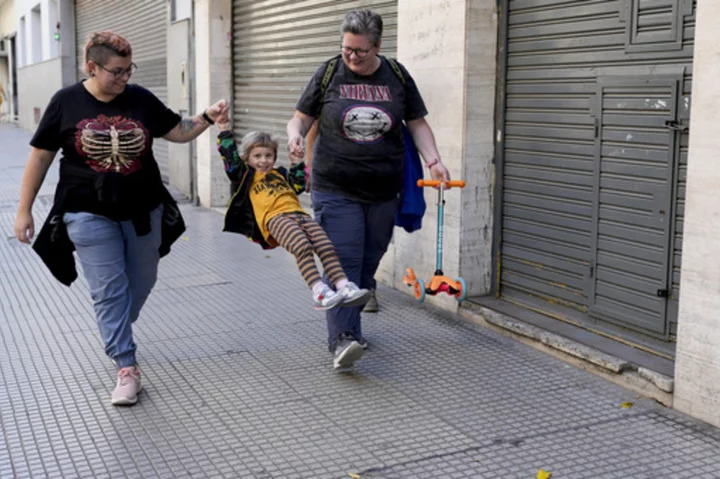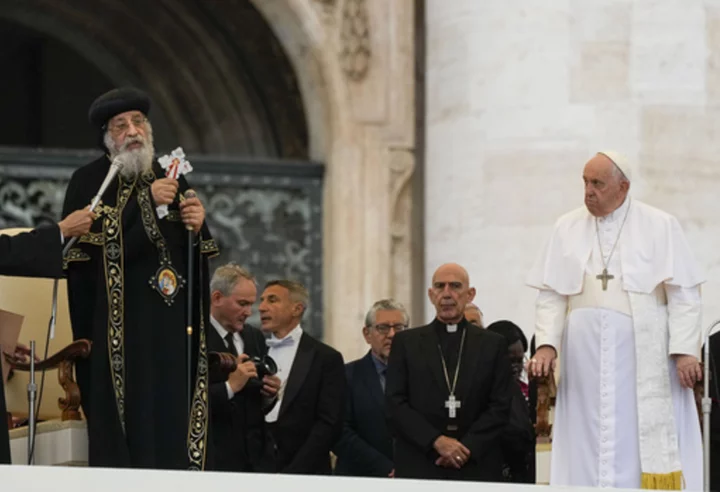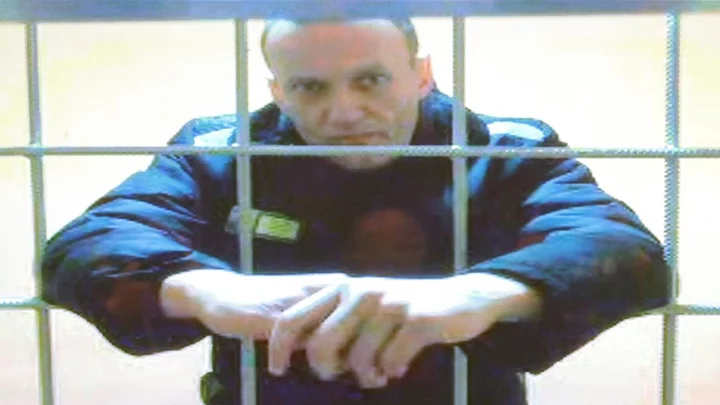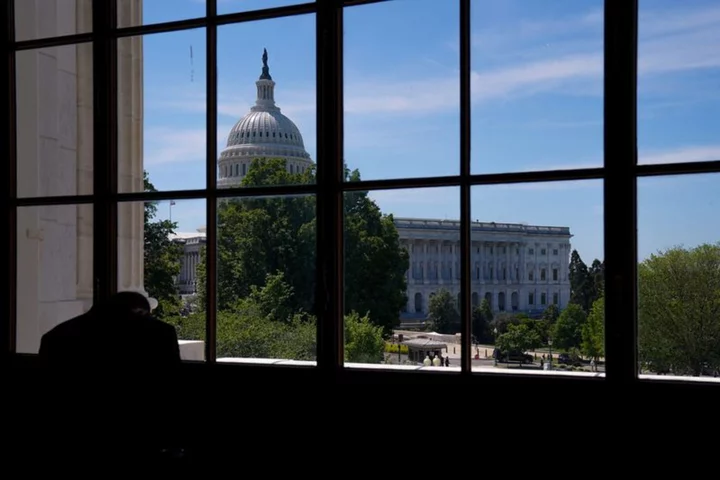BUENOS AIRES, Argentina (AP) — Anastasia Domini and wife Anna Domini walked hand in hand on a recent sunny day in Argentina’s capital while their four restless children played nearby.
It's a common sight in a country where same-sex marriage has been legal for more than a decade. But the couple, who got married shortly after arriving in Buenos Aires early last year, still remember the fear they felt when they first decided to hold hands in public after leaving Russia, which explicitly outlawed same-sex marriages in 2020.
“It was really scary,” Anastasia Domini said, but “we were looking around and really, really nobody was looking.”
For the Dominis, who changed their last names so they could more convincingly pretend to be sisters in Russia, the stroll exemplified how much their lives had changed since they moved, joining an increasing number of LGBTQ+ Russians who decided to leave their homeland and settle in Argentina to escape discrimination and the war with Ukraine.
Over the past decade, living openly as a member of the LGBTQ+ community in Russia has grown increasingly difficult.
In December 2022, Russian President Vladimir Putin signed a law that significantly expanded restrictions on activities seen as promoting LGBTQ+ rights in the country, building on a law that had been in place since 2013 and that independent researchers say led to a surge in violence against sexual minorities.
More recently, the Kremlin has even framed the February 2022 invasion of Ukraine partly as a way to defend conservative values against Western promotion of gay and transgender rights.
The Argentine LGBT Federation has received about 130 inquiries in the past year and a half from Russians interested in seeking refuge in Argentina, more than any other nationality.
“The conflict between Russia and Ukraine has accelerated the decision of many people who were already in a vulnerable situation,” said Maribe Sgariglia, who heads the organization’s international relations department.
Members of the LGBTQ+ community aren't the only Russians coming to Argentina. In January, 4,523 Russians entered Argentina, more than four times the 1,037 that arrived in the same month last year, according to government figures. In 2022, some 22,200 Russians entered Argentina, including a large number of pregnant women who have flown into the country to give birth, partly in a bid to obtain a passport that opens more doors.
For at least some of the Russians arriving in Argentina, the country wasn't their first choice.
Mark Boyarsky, a 38-year-old trans man who left Moscow with his wife and two children, aged 5 and 8, shortly after Russia’s invasion of Ukraine last year, first moved to Nepal in a bid to get a British visa. After several fruitless months, they decided to move to Argentina in September.
It “feels so safe for me here,” Boyarsky said, noting that he has yet to tell his children that he’s trans because “it felt too dangerous for them” to know that back home considering there’s a general belief that “there are no gays in Russia.”
Two years after marriage equality became law in Argentina in 2010, Congress approved a pioneering Gender Identity Law that codified rights for transgender individuals, including the ability to change names without the need for medical evaluations.
Boyarsky works as an independent photographer and often snaps photos at same-sex weddings involving Russian immigrants. At least 34 Russian same-sex couples got married in Argentina in 2022, and 31 so far this year, according to the Argentine LGBT Federation.
Recently, Boyarsky photographed the wedding of Nadezhda Skvortosova, 22, and Tatiana Skvortosova, 29, who got married less than a month after moving to Buenos Aires. The pair had also changed their last names in Russia so they could pretend to be sisters.
“It’s a very important moment for us. We’re waiting for very long to be officially family,” Nadezhda Skvortosova said after getting married at a Buenos Aires civil registry.
Many of the Russians who arrive in Argentina knew little about the country before moving.
“Tango, Che Guevera, and that it was a Spanish colony,” joked Nikolai Shushpan, a 26-year-old gay man who moved to Argentina’s capital in October when he started fearing he could be drafted into the war.
Shuspan now shares an apartment in downtown Buenos Aires with Dimitry Yarin, a fellow Russian he met on a dating app.
Yarin, 21, said he long had plans to move to a more tolerant country but “the war accelerated that decision.”
Because of the discrimination they face at home, many of the Russians who arrive in Argentina request refugee status, a process that can take as long as three years.
Authorities have increased controls on Russian migrants recently after the arrest of two alleged Russian spies with Argentine passports in Slovenia late last year.
For now, Shuspan is enjoying living openly as a gay man for the first time. Back home, there was always tension and the feeling “that something could happen.”
“The only country where I didn’t feel that is here. You don’t have to be worried all the time. The only thing you have to worry about is prices,” Shuspan said, referring to Argentina's inflation rate — one of the world’s highest — of about 110%.
After a little more than a year in Argentina, the Dominis share that feeling of relief.
In the northwestern Russian city of Petrozavodsk, Anastasia, 34, and Anna, 44, barely told anyone about their relationship and two sets of twins, ages 3 and 6. There was a constant fear authorities would take their children away and put them in an orphanage, Anastasia Domini said.
Now they live without having to worry that someone could take their kids or put them in prison.
“We’re absolutely used to our status of married women and that we are parents of lots of kids and that we can be free here,” she said.
___
Associated Press videographers Victor R. Caivano and Yesica Brumec contributed to this report. AP reporter Elise Morton contributed from London.









